
Blues is a music genre and musical form that originated amongst African-Americans in the Deep South of the United States around the 1860s. Blues has incorporated spirituals, work songs, field hollers, shouts, chants, and rhymed simple narrative ballads from the African-American culture. The blues form is ubiquitous in jazz, rhythm and blues, and rock and roll, and is characterized by the call-and-response pattern, the blues scale, and specific chord progressions, of which the twelve-bar blues is the most common. Blue notes, usually thirds, fifths or sevenths flattened in pitch, are also an essential part of the sound. Blues shuffles or walking bass reinforce the trance-like rhythm and form a repetitive effect known as the groove.

John Lee Hooker was an American blues singer, songwriter, and guitarist. The son of a sharecropper, he rose to prominence performing an electric guitar-style adaptation of Delta blues that he developed in Detroit. Hooker often incorporated other elements, including talking blues and early North Mississippi hill country blues. He developed his own driving-rhythm boogie style, distinct from the 1930s–1940s piano-derived boogie-woogie. Hooker was ranked 35 in Rolling Stone's 2015 list of 100 greatest guitarists, and has been cited as one of the greatest male blues vocalists of all time.
Rock and roll is a genre of popular music that evolved in the United States during the late 1940s and early 1950s. It originated from African American music such as jazz, rhythm and blues, boogie-woogie, electric blues, gospel, and jump blues, as well as country music. While rock and roll's formative elements can be heard in blues records from the 1920s and in country records of the 1930s, the genre did not acquire its name until 1954.

Robert Leroy Johnson was an American blues musician and songwriter. His landmark recordings in 1936 and 1937 display a combination of singing, guitar skills, and songwriting talent that has influenced later generations of musicians. Although his recording career spanned only seven months, he is recognized as a master of the blues, particularly the Delta blues style, and as one of the most influential musicians of the 20th century. The Rock and Roll Hall of Fame describes him as perhaps "the first ever rock star".
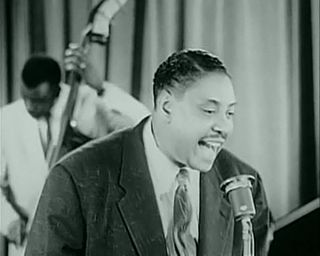
Rhythm and blues, frequently abbreviated as R&B or R'n'B, is a genre of popular music that originated within African-American communities in the 1940s. The term was originally used by record companies to describe recordings marketed predominantly to African Americans, at a time when "rocking, jazz based music ... [with a] heavy, insistent beat" was becoming more popular. In the commercial rhythm and blues music typical of the 1950s through the 1970s, the bands usually consisted of a piano, one or two guitars, bass, drums, one or more saxophones, and sometimes background vocalists. R&B lyrical themes often encapsulate the African-American history and experience of pain and the quest for freedom and joy, as well as triumphs and failures in terms of societal racism, oppression, relationships, economics, and aspirations.
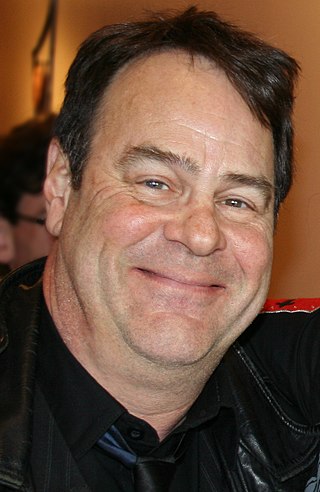
Daniel Edward Aykroyd is a Canadian and American actor, comedian, screenwriter, and producer.
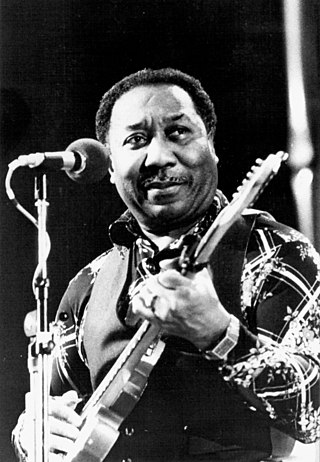
McKinley Morganfield, known professionally as Muddy Waters, was an American blues singer and musician who was an important figure in the post-World War II blues scene, and is often cited as the "father of modern Chicago blues". His style of playing has been described as "raining down Delta beatitude".

The Blues Brothers are an American blues and soul revue band founded in 1978 by comedians Dan Aykroyd and John Belushi, who met and began collaborating as original cast members of Saturday Night Live.

The Moody Blues were an English rock band formed in Birmingham in May 1964. The band initially consisted of Graeme Edge (drums), Denny Laine (guitar/vocals), Mike Pinder (keyboards/vocals), Ray Thomas (multi-instrumentalist/vocals), and Clint Warwick (bass/vocals). Originally part of the British beat and R&B scene of the early–mid 1960s, the band came to prominence with the UK No. 1 and US Top 10 single "Go Now" in late 1964/early 1965. Laine and Warwick both left the band in 1966, with Edge, Pinder and Thomas recruiting new members Justin Hayward (guitar/vocals) and John Lodge (bass/vocals). They embraced the psychedelic rock movement of the late 1960s, with their second album, 1967's Days of Future Passed, being a fusion of rock with classical music that established the band as pioneers in the development of art rock and progressive rock. It has been described as a "landmark" and "one of the first successful concept albums".

Riley B. King, known professionally as B. B. King, was an American blues guitarist, singer, songwriter, and record producer. He introduced a sophisticated style of soloing based on fluid string bending, shimmering vibrato, and staccato picking that influenced many later blues electric guitar players. AllMusic recognized King as "the single most important electric guitarist of the last half of the 20th century".

Jamesetta Hawkins, known professionally as Etta James, was an American singer and songwriter who performed in various genres, including gospel, blues, jazz, R&B, rock and roll, and soul. Starting her career in 1954, she gained fame with hits such as "The Wallflower", "At Last", "Tell Mama", "Something's Got a Hold on Me", and "I'd Rather Go Blind". She faced a number of personal problems, including heroin addiction, severe physical abuse, and incarceration, before making a musical comeback in the late 1980s with the album Seven Year Itch.

Blues Traveler is an American rock band that formed in Princeton, New Jersey, in 1987. They are known for their extensive use of segues in live performances, and could be considered a key part of the re-emerging jam band scene of the 1990s, spearheading the H.O.R.D.E. touring music festival.
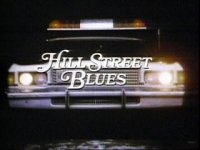
Hill Street Blues is an American serial police procedural television series that aired on NBC in prime-time from January 15, 1981, to May 12, 1987, for 146 episodes. The show chronicles the lives of the Metropolitan Police Department staff of a single police station located on Hill Street in an unnamed large U.S. city. The "blues" are the police officers in their blue uniforms.

Henry St. Claire Fredericks Jr., better known by his stage name Taj Mahal, is an American blues musician. He plays the guitar, piano, banjo, harmonica, and many other instruments, often incorporating elements of world music into his work. Mahal has done much to reshape the definition and scope of blues music over the course of his more than 50-year career by fusing it with nontraditional forms, including sounds from the Caribbean, Africa, India, Hawaii, and the South Pacific.

George "Buddy" Guy is an American blues guitarist and singer. He is an exponent of Chicago blues who has influenced generations of guitarists including Eric Clapton, Jimi Hendrix, Jimmy Page, Keith Richards, Stevie Ray Vaughan, Jeff Beck, Gary Clark Jr. and John Mayer. In the 1960s, Guy played with Muddy Waters as a session guitarist at Chess Records and began a musical partnership with blues harp virtuoso Junior Wells.
Blues rock is a fusion genre and form of rock music that relies on the chords/scales and instrumental improvisation of blues. It is mostly an electric ensemble-style music with instrumentation similar to electric blues and rock. From its beginnings in the early to mid-1960s, blues rock has gone through several stylistic shifts and along the way it inspired and influenced hard rock, Southern rock, and early heavy metal.
House of Blues Entertainment, LLC. is an American chain of live music concert halls and restaurants. It was founded by Isaac Tigrett, the co-founder of Hard Rock Cafe, and Dan Aykroyd, co-star of the 1980 film The Blues Brothers. The first location opened at Harvard Square in Cambridge, Massachusetts on November 26, 1992. The chain has been a division of Live Nation Entertainment since July 2006, and there are 11 locations throughout the United States as of July 2020.
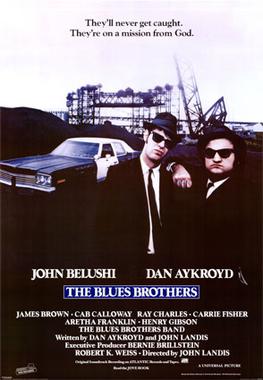
The Blues Brothers is a 1980 American musical action comedy film directed by John Landis. It stars John Belushi as "Joliet" Jake Blues and Dan Aykroyd as his brother Elwood, characters developed from the recurring musical sketch "The Blues Brothers" on NBC's variety series Saturday Night Live. The script is set in and around Chicago, Illinois, where it was filmed, and the screenplay is by Aykroyd and Landis. It features musical numbers by singers James Brown, Cab Calloway, Aretha Franklin, Ray Charles and John Lee Hooker. It features non-musical supporting performances by Carrie Fisher and Henry Gibson.

The St. Louis Blues are a professional ice hockey team based in St. Louis. The Blues compete in the National Hockey League (NHL) as a member of the Central Division in the Western Conference. The franchise was founded in 1967 as one of the six teams from the 1967 NHL expansion and is named after the W. C. Handy song "Saint Louis Blues". They play their home games at the 18,096 seat Enterprise Center in downtown St. Louis, which has been their arena since moving from St. Louis Arena in 1994.
















